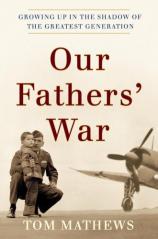Our Fathers' War: Growing Up in the Shadow of the Greatest Generation
Review
Our Fathers' War: Growing Up in the Shadow of the Greatest Generation
America's young men and women who grew up quickly during the 1940s
became known as the Greatest Generation for their willingness to
sacrifice for their country and families. Many were born into
immigrant households; their parents came to this country for myriad
reasons, whether to escape religious or political persecution or
simply to make a better economic life.
These "children" answered the call to duty, often at a terrible
price. Even those who were fortunate enough to return from the
battlefields did so as damaged goods, carrying scars both physical
and psychic from their ordeals, problems that did not always end
when they reached the safety of their home shores.
Tom Mathews was a son of one of these veterans. He relates his
awkward experiences, and those of his contemporaries, in OUR
FATHERS' WAR: Growing Up in the Shadow of the Greatest
Generation.
The long-time Newsweek writer and editor reports on ten
families for which those aforementioned scars never completely
faded. The fathers returned home, still young men, to their own
children born in their absence. Their need to feel control, after
years when much was out of their control, impacted on these
children. They were demanding, with little patience for what they
perceived as weakness or cowardice in their progeny.
Grace under fire did not come easily to the older generation of
Mathews's work. Despite accomplishing extraordinary things, many
cursed themselves for self-imposed failures to act like Audie
Murphy, one of WWII's most legendary figures.
Mathews writes of Murphy's own account of the action that won him
the Congressional Medal of Honor, in which the All-American hero
admitted to being scared.
"Manically, I hauled down the Oxford English Dictionary's
giant Volume C. First I looked up courage: 'that quality of mind
which shows itself in facing danger without fear or
shrinking.'
'I was scared' [Murphy had written].
"Then I checked out coward: 'one who displays ignoble fear or want
of courage in the face of danger.'
'I was scared' [Murphy had written].
"What was this? Either Audie Murphy was yellow or the accepted
definition was full of s---. You didn't have to be a genius to
cipher it out.... Without fear there could be no courage."
The theme of fear under wartime conditions, and the determination
not to show such weakness back home, is a main component of each
chapter.
Many veterans refused to talk about their experiences, perhaps
believing that if you weren't there, there was no way you could
understand. They passed their physic scars on to their children who
grew up confused, at once desirous of the love and approval of
their fathers, but at the same time repelled by the inexplicable
hostility --- even physical abuse --- they received. In some cases
the need for approval manifested itself when it was the younger
generation's turn to fight in Vietnam, some of the sons acting
heroically if recklessly, as if that would finally win their old
man over.
As the book concludes with Mathews's reconciliation with his own
father, readers might come to think that this book was a purgative
for the author's troubled soul. He finds comfort in others like him
(and it's amazing how many others there are).
A truly touching story, told with an aching longing for acceptance,
understanding and love, OUR FATHERS' WAR is one that could carry
over to present-day fathers and sons stuck in the quagmire of mis-
or incommunications.
Reviewed by Ron Kaplan (RonK23@aol.com) on January 14, 2011
Our Fathers' War: Growing Up in the Shadow of the Greatest Generation
- Publication Date: May 10, 2005
- Genres: History, Nonfiction
- Hardcover: 304 pages
- Publisher: Broadway
- ISBN-10: 0767914201
- ISBN-13: 9780767914208




